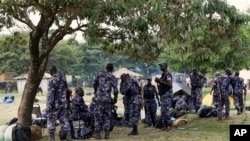At least 149 people have been arrested in a restive region of western Uganda where clashes with a tribal militia have killed at least 62 people, a government official said Tuesday as the security forces continued to search the mountainous the area for rebels.
Most of those killed or in detention are guards who protected a traditional monarch accused of harboring the rebels in the western Kasese district, a stronghold of the political opposition and near the border with Congo.
The king, Charles Wesley Mumbere of the Kingdom of Rwenzururu, is now in detention after his palace was assaulted by the military on Sunday.
At least 46 supporters of the king and 16 police have died in the clashes, according to Ugandan police spokesman Andrew Felix Kaweesi.
Interior Minister Jeje Odongo told reporters Tuesday that weapons, including automatic guns and a cache of crude weapons such as spears and machetes, had been seized following the assault on the palace.
The killings underscore tensions between longtime President Yoweri Museveni and influential tribal rulers who are constitutionally recognized but have no real authority or armies of their own. Ahead of presidential polls in February, which were won by Museveni, Mumbere came out in support of the opposition, a move that appeared to violate the traditional leaders' code of conduct.
Museveni lost the popular vote in Kasese, and a month later clashes erupted between the security forces and militiamen who were believed to be loyal to Mumbere. Among the king's supporters are separatists who hope to create a new republic called Yiira, which would include Mumbere's Bakonzo people and their relatives across the border in Congo. The separatists are accused of printing their own money and even collecting taxes in some parts of the area.
In March, amid clashes between Mumbere's supporters and security officials, Museveni vowed to defeat the separatists, who complain of marginalization by the central government 340 kilometers (211 miles) away in the capital, Kampala.
"There can never be a Yiira Republic,'' Museveni said at the time.
Mumbere denies being the commander of the separatists.
Rights groups are urging Ugandan security forces to show restraint.
Amnesty International said there were shocking examples of unlawful killings and a complete disregard for human rights during the arrests, and that many victims seem to have been summarily shot dead and their bodies dumped.
Opposition leader Kizza Besigye described the killings as a ``massacre'' and posted a photo on Twitter purporting to show bodies of victims outside Mumbere's palace.
The attack on the palace shocked many in this East African country that Museveni has ruled since 1986. Although tribal leaders only have ceremonial powers, are revered among their subjects and are influential in their regions. Television footage showed Mumbere being led to a police station as a soldier jerked him by the trousers following the deadly assault on the palace.
Museveni, who took power by force three decades ago, has struggled to win over the support of the Bakonzo people in presidential elections. There are frequent land disputes in the area, with many accusing the government of sponsoring land grabs. A new plan to divide Kasese district into two parts has also been fiercely opposed.




